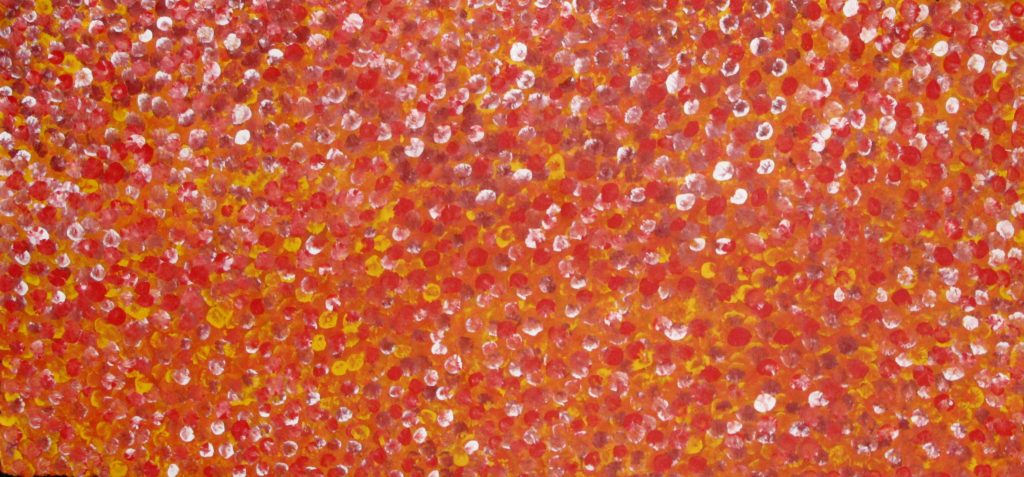
ARTIST: Josie Petrick Kemarre c.1953 –
TITLE: Bush Berries
LANGUAGE/REGION: Anmatyerre/Atitjera (Harts Range) – NT
YEAR: 2012
DIMENSIONS: 187.0cm x 90.0cm
MEDIUM: synthetic polymer paints on Belgian linen
DTA CATALOGUE: #4214
DREAMINGS: Bush Berries, Bush Flowers, Women’s Awelye (ceremony/dancing) and Women’s Dreamings
Josie Petrick Kemarre was born at Santa Teresa Mission. She is a fully initiated member of the Anmatyerre Tribe. Josie is the niece of the late Emily Kame Kngwarreye and is also the cousin of famous artist Gloria Petyarre. She had a bush marriage to Robin (now deceased) and lived with him in Mt Swan in the region of Utopia where they raised 8 children (one of them was her nephew).
Josie has had interesting jobs in the past, her first was a chef and she was also a translator for the Central Land Council. Josie first painted in the early 1990’s and has since developed a style that celebrates the abundance of native bush foods found in the desert for tucker and also the traditional responsibilities of being a woman of her land. Her interpretations are usually represented in clean multitude of dots displayed in various colours or the innovative brush dotting where the colours are mixed on the canvas. Her approach to art is modern, contemporary and innovative stylising the traditional dotting construction in her own way.
Bush Berries Dreaming
Josie’s ‘Bush Berries’ Dreaming is a representation of the berries in abundance after the rain of an area near Utopia, approximately 270 kms North East of Alice Springs. It represents the berries that can be found on her country and is a testament to her role as a food gatherer and nurturer. The women from Josie’s community believe that there are spirits who have the power to give their country fertility and strength to grow abundant bush food. It is the same spirits that gives them guidance and knowledge to find these foods essential to their survival. The painting depicts an aerial viewpoint of the earth showing the ever-changing colours and textures in the Central Desert landscape as well as the life cycle of the plant. Understanding and knowing where to find bush foods in the arid deserts of Australia have been passed on to Josie through stories and painting. This transfer of knowledge is imperative for the stories to be carried on for generations and for the survival of the Indigenous communities of Australia.
Bush Foods (Bush Tucker)
Since time immemorial Aboriginal women have been the principal gatherers of bush foods ie; .fruits, plants, edible roots and seeds. The role women play within community is considered as the other half of an indivisible whole. Through ceremony, songs, oral teachings and art, each woman learns their craft from another member of the family (commonly but not always) by another woman who is older. The passing of knowledge from female to female is known as ‘Women’s Business’ whereby men typically cannot participate in the ceremonies and sharing of the knowledge. Understanding and knowing about Bush Foods are a major part of the women’s responsibilities when existing within a community and the contribution of this knowledge allows for the whole existence as a community to thrive and survive. The knowledge and ability to locate foods within the desert is imperative to Aboriginal life. It serves as a means of survival and a way of ensuring Aboriginal existence contributing to human fertility and reproduction.
Read more about Indigenous Culture and Community
© Dreamtime Art 2018
Please Note: This biography and Intellectual Property including Indigenous Cultural Intellectual Property belongs to Dreamtime Art, the artists/their estates and is subject to copyright. To protect these copyrights, no reproduction of any or all parts is allowed unless there is prior written permission and approval by Dreamtime Art.
[wpforms id=”49826″ title=”true”]
